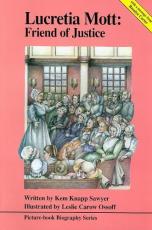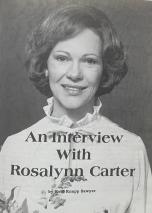Rosalynn Carter wrote the introduction to “Lucretia Mott: Friend of Justice,” the first of my biographies for young readers.
I was thrilled and deeply honored—even more so when I learned she did more than put her name to an introduction someone else had written. She insisted on writing it herself, taking time on a long cross-country airplane trip.
Lucretia Mott, the Quaker abolitionist, peace leader, and women’s rights advocate, had made her home in Philadelphia a station on the underground railroad. In 1848, she organized the First Woman’s Rights Convention at Seneca Falls. The two must have clicked—the former first lady bonding with a heroine from history, maybe lesser known than some but still one of our country’s greatest. Many of the issues Rosalynn Carter supported were first championed by Lucretia Mott, from women’s rights and civil rights to peace and conflict resolution. Both women were willing to take on unpopular causes. Both cared deeply for family.
“When she believed strongly in a cause, she was willing to work hard to see it through,” Mrs. Carter wrote in the introduction to “Lucretia Mott.” The same could be said of Mrs. Carter.
I’ve given the life and role of first ladies a fair bit of thought while researching and writing biographies of Eleanor Roosevelt and Abigail Adams. I have yet to write one of Rosalynn Carter, but I did have the great pleasure of interviewing her by phone for “Cobblestone,” a history magazine for young people. That was in 1992, but an interview I still treasure. (And I still remember feeling nervous when her assistant put the call through.) Mrs. Carter talked about her wide and varied work in human rights, her advocacy for fair elections, caregivers, refugees, and mental health.
Rosalynn Carter was only 13 at the time her father died. Her mother raised the family on her own. When I asked what childhood experiences prepared her for becoming such an active First Lady, she answered that watching her mother take charge taught her that “one can do what is necessary. When I stand back now and think, ‘How did I do that?’ I know it was because it had to be done.”
And the advice she would give future first ladies? “Work on things that are important to you,” she said, adding “At first I was hurt by some of the criticism, and then I realized you’re going to get criticism no matter what you do, so you might as well just be yourself.” Good advice for us all—and a conversation for which I’ll always be grateful. Happy Thanksgiving!

